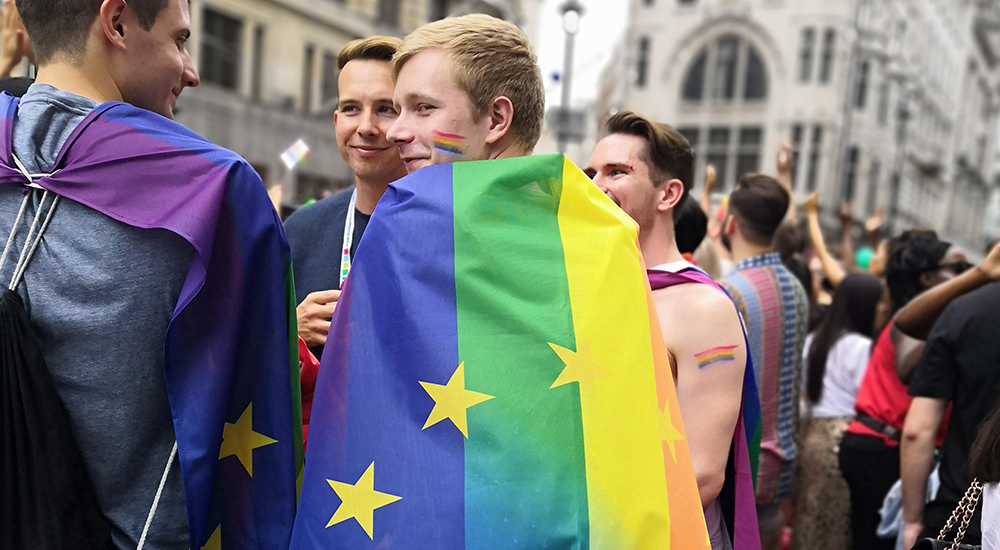On September 23 The Finnish Presidency of the Council of the European Union and the European Commission will host a high-level conference on ‘Advancing LGBT+ equality in the EU: from 2020 and Beyond’, with speakers from Member States, the European Parliament, the European Commission and international NGOs. The debates and discussions of the conference will inform future policies aiming at advancing LGBT+ equality in the EU.
The conference takes place at a time when the erosion of the human rights of LGBT+ people along with the rise of anti-LGBT+ hate rhetoric in some EU countries is putting European democracy at risk and eroding core founding principles of the EU such as equality, freedom and human dignity. Over the last year, the Polish LGBT+ community has been pulled into the middle of political confrontations that are stoking hatred, inciting violence and negatively impacting lives. In the run-up to the European elections and now Parliamentary elections in October, political actors from Poland’s leading Law and Justice (PiS) party – including government ministers – are carrying out a demonisation campaign against the LGBT+ community while closely siding with conservative religious leaders.
The developments in Poland do not stand alone. In Europe and around the world, there has been a sharp rise in hate and divisiveness, often targeting marginalised groups such as LGBT+ people, while in some countries regressive legislation is being introduced. In Bulgaria, the means for trans people to change their names or gender markers on official documents have been removed. In Croatia, the government failed to renew action plans on equality.
Meanwhile, the governments of Bulgaria, Hungary and Turkey have failed to uphold fundamental civil and political rights such as freedom of assembly at LGBT+ Pride events, freedom of association and protection of human rights defenders.
Anti-LGBT+ discourse and legislation are increasingly entering the global political stage and influencing societies, propagated by populist leaders stoking fear and breeding intolerance for the sake of political gain. Politicians in the Bulgarian city of Plovdiv, one of this year’s European Capitals of Culture, campaigned to block an LGBT+ exhibition. Attacks by the far-right Vox party on LGBT+ rights are testing years of political consensus on the issue in Spain, which in 2005 became only the third country in the world to allow same-sex marriage.
???️? An #LGBTI strategy, adopted and owned by the political leadership of @EU_Commission, would give a very important political sign that the EU will strengthen its work on the human rights of LGBTI people in the #EuropeanUnion. ➡️ https://t.co/LIrljVgsvy #ThisIsWhy pic.twitter.com/FVPz35oUh7
— ILGA-Europe (@ILGAEurope) September 18, 2019
The rights and freedom of LGBT+ communities is a litmus test of EU democracy and values, and upholding those rights and freedoms is core to fundamental EU values.
That is why it is vital at this critical time for the Commission to stand strong on fundamental rights and not let a minority of states erode and undermine EU values. Now more than ever it is time for the Commission to adopt a comprehensive LGBT+ strategy that is wholly intersectional and consults with Parliament and civil society on how to mainstream LGBT+ rights across its programmes for the next five years.
An EU LGBT+ strategy, adopted and owned by the political leadership of the European Commission would give a very important political sign that the EU will not only continue but also strengthen its work on protecting and advancing the human rights of LGBT+ people in the European Union. Also, it will help all Directorate Generals of the European Commission to feel empowered to ensure full implementation of existing commitments and to plan proposals and actions that will advance LGBT+ human rights and equality.
A small number of governments may be pushing back on LGBT+ rights and freedoms, and engaging in hateful rhetoric, but they threaten the larger body of states that are on the side of human rights at a critical time in Europe and the world.
Says Evelyne Paradis, Executive Director of ILGA-Europe: “The governments of some countries and other forces within the EU are overtly turning the tide on LGBT+ and other minority rights, seeking to replace democracy and diversity with ‘traditional values’. Their voices may be loud, but we know that most member states want to see continual progress towards equality for LGBT+ people in Europe.
“The rights and freedom of the LGBT+ community are not separate from the rights and freedom of all who live in Europe, and the erosion of those rights is a marker for the erosion of all fundamental human rights. That is why now, more than ever, we need the next European Commission to adopt an EU-level LGBT+ strategy.”
For more information, see ilga-europe.org
© 2019 GCN (Gay Community News). All rights reserved.
Support GCN
GCN is a free, vital resource for Ireland’s LGBTQ+ community since 1988.
GCN is a trading name of National LGBT Federation CLG, a registered charity - Charity Number: 20034580.
GCN relies on the generous support of the community and allies to sustain the crucial work that we do. Producing GCN is costly, and, in an industry which has been hugely impacted by rising costs, we need your support to help sustain and grow this vital resource.
Supporting GCN for as little as €1.99 per month will help us continue our work as Ireland’s free, independent LGBTQ+ media.

comments. Please sign in to comment.